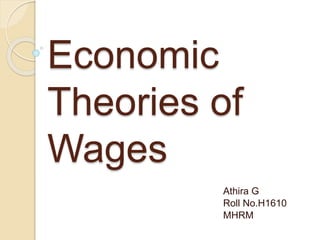Economic theories of wages
•Download as PPTX, PDF•
29 likes•21,580 views
Economic theories of wages
Report
Share
Report
Share

Recommended
Recommended
In this presentation, we will understand concept theories and types of wages, compensations and earnings.
To know more about Welingkar School’s Distance Learning Program and courses offered, visit:
http://www.welingkaronline.org/distance-learning/online-mba.html
Wages: Concepts and Theories

Wages: Concepts and TheoriesWe Learn - A Continuous Learning Forum from Welingkar's Distance Learning Program.
More Related Content
What's hot
In this presentation, we will understand concept theories and types of wages, compensations and earnings.
To know more about Welingkar School’s Distance Learning Program and courses offered, visit:
http://www.welingkaronline.org/distance-learning/online-mba.html
Wages: Concepts and Theories

Wages: Concepts and TheoriesWe Learn - A Continuous Learning Forum from Welingkar's Distance Learning Program.
What's hot (20)
Principles of compensation management - compensation management - Manu Melwi...

Principles of compensation management - compensation management - Manu Melwi...
Statutory and non statutory welfare schemes at workplace

Statutory and non statutory welfare schemes at workplace
Introduction to compensation meaning and objectives

Introduction to compensation meaning and objectives
Viewers also liked
Viewers also liked (6)
Similar to Economic theories of wages
Similar to Economic theories of wages (20)
Wage theories - compensation management - Manu Melwin Joy

Wage theories - compensation management - Manu Melwin Joy
Theories of Unemployment, Philip Curve and its Controversies

Theories of Unemployment, Philip Curve and its Controversies
Recently uploaded
Recently uploaded (6)
100%Safe delivery(+971558539980)Abortion pills for sale..dubai sharjah, abu d...

100%Safe delivery(+971558539980)Abortion pills for sale..dubai sharjah, abu d...
Will Robots Steal Your Jobs? Will Robots Steal Your Jobs? 10 Eye-Opening Work...

Will Robots Steal Your Jobs? Will Robots Steal Your Jobs? 10 Eye-Opening Work...
Webinar - How to set pay ranges in the context of pay transparency legislation

Webinar - How to set pay ranges in the context of pay transparency legislation
2k Shots ≽ 9205541914 ≼ Call Girls In Vinod Nagar East (Delhi)

2k Shots ≽ 9205541914 ≼ Call Girls In Vinod Nagar East (Delhi)
Economic theories of wages
- 1. Economic Theories of Wages Athira G Roll No.H1610 MHRM
- 2. The Economic theories of wages are: 1.Subsistence Theory 2.Wages fund Theory 3.The residual claimant Theory 4.The surplus value Theory 5.Marginal productivity Theory 6.The bargaining Theory of wages 7.Employment Theory 8.Competitive Theory
- 3. 1.Subsistence Theory By David Ricardo Labourers are paid to enable them to subsist and perpetuate the race without increase or diminution. Assumptions: If the workers were paid more than subsistence wage, the number would increase.
- 4. 2.Wages fund Theory Adam Smith Wages are paid out of a predetermined fund of wealth. If fund is large, wages should be high and if it is small wages would be reduced. Demand for labour and wages paid are determined by the size of the fund. Francis A walker attacked the theory.
- 5. 3.The residual claimant Theory Francis a Walker 4 factors of production, land,labour,capital and entrepreneurship. Labour is the residual claimant. This theory does not explain how trade unions are able to increase the wages. It does not consider role of labour i productivity.
- 6. 4.The surplus value Theory Marxian theory - Karl Marx Labour is an article of commerce, which could be purchased on payment of ‘subsistence price’. Price of any product is determined by the labour time needed for producing it. The labour is not paid in proportion to the time spent on work, but much less, and the surplus went over, to be utilized for paying other expenses.
- 7. 5.Marginal productivity Theory Philips Henry and Bates Clark Wages are based upon an entrepreneurs estimate of the value that will probably be produced by the last or marginal worker. It assumes that wages depend upon the demand for, and supply of, labour. Workers are paid what they are economically worth. The result is that the employer has a larger share in profit as has not to pay to the non-marginal workers.
- 8. 6.The bargaining Theory of wages John Davidson Wages are determined by the relative bargaining power of workers or trade unions and of employers. when a trade union is involved, basic wages, fringe benefits, job differentials and individual differences tend to be determined by the relative strength of the organisation and the trade union.
- 9. 7.Employment Theory Supply and demand theory It is based on the inter-relation between wages and employment. Unemployment would disappear, if workers were to accept a voluntary cut in wages, pleaded for wage flexibility for promoting employment at a time of organisation depression. The lowering in prices would cause additional demand, which will increase production, and will increase employment of workers.
- 10. 8.Competitive Theory Wages were fixed in accordance with demand and supply, workers would be attracted by high wages to industries, occupations and localities.